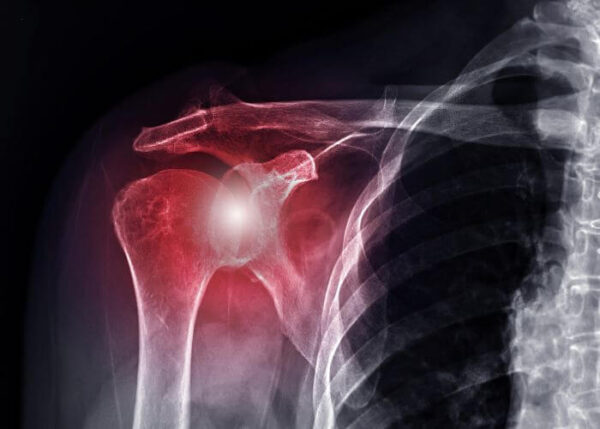Shoulder Cartilage Injury Specialist

Are you and athlete who plays contact sports such as hockey or football? Have you experienced a shoulder dislocation? If so, you may be at risk of an articular cartilage injury in the shoulder. Articular cartilage injuries in the shoulder can cause pain, weakness, and loss of range of motion. Articular cartilage injury specialist, Doctor Riley J. Williams provides diagnosis as well as surgical and nonsurgical treatment options for patients in Manhattan, Brooklyn, New York City and surrounding areas who have sustained an articular cartilage shoulder injury. Contact Dr. Williams’ team today!
What is an articular cartilage shoulder injury?
There are three types of cartilage in the body: fibrous, elastic and hyaline. Articular cartilage is a type of hyaline cartilage or tissue found on the ends of bones between joints. Intact articular cartilage facilitates smooth and painless joint motion. It is the most common type of cartilage and can be found between the two main bones that make up the glenohumeral (shoulder) joint. One bone is the scapula (shoulder blade) and the other is the humerus (upper arm bone). Damage to the cartilage in the shoulder can be limited to a focal area; focal areas of shoulder cartilage damage are more common in younger patients. If the damaged area is diffuse (large), it is typically referred to as arthritis, and is more commonly noted in older patients. Cartilage damage often stems from overuse of the joint or from an injury. Injuries may include shoulder dislocation associated with a fall or a direct impact to the shoulder. Dr. Riley J. Williams, orthopedic shoulder specialist, serving Manhattan, Brooklyn, New York City, NY and surrounding areas, has extensive experience in treating articular cartilage shoulder injuries.

What are the symptoms of an articular cartilage shoulder injury?
Individuals in the New York area with articular cartilage shoulder injuries often report the following symptoms:
- Pain and weakness in the shoulder joint
- Clicking, popping, or grinding sensation, mechanical symptoms
- Swelling
- Pain exacerbated by activity or exercise of the shoulder
- Limited range of motion
How is an articular cartilage shoulder injury diagnosed?
Dr. Williams will do a thorough evaluation and assessment. He asks patients questions about their medical history, activity level, symptom duration, and provocative activities that make the pain worse. He will also do a full physical examination of the shoulder and neck. Radiographs of the affected shoulder are almost always part of the examination. If appropriate, a CT scan or MRI is ordered as well. These imaging studies can demonstrate the cartilage damage, and allows Dr. to determine if the issue is focal or diffuse.
How is an articular cartilage shoulder injury treated?
Non-surgical treatment:
Conservative treatment methods are usually the first line of defense for articular cartilage shoulder injuries. An individual may be instructed to rest and ice the shoulder to get the inflammation under control. Excessive joint movement worsen shoulder pain associated with cartilage damage. The use of NSAIDs (non-steroidal anti-inflammatories) can also help manage pain. If these measures do not alleviate the pain, intra-articular corticosteroid, or Platelet Rich Plasma (PRP) injections can be helpful in decreasing shoulder pain due to cartilage damage. Physical therapy focused on improving range of motion and shoulder girdle strengthening are routinely used in patients suffering symptomatic shoulder cartilage injuries. Articular cartilage injuries do not heal on their own, so it is important to follow Dr. Williams’ orders to help prevent further damage.
Surgical treatment:
If non-operative treatments fail, Dr. Williams may suggest surgery to help alleviate the persistent shoulder pain. There are a number of different procedures employed to treat individuals with symptomatic shoulder cartilage damage. Dr. Williams will discuss which surgical option is best suited for treating the problem. These procedures are typically done arthroscopically (minimally invasive) on an outpatient basis. These procedures require the use of small incisions made around the shoulder joint. A small fiber-optic camera (arthroscope) and small surgical tools are used to perform the procedure. Loose pieces of cartilage are removed; areas of focal cartilage damage are smoothed. Any visible inflammatory tissue is removed to decrease joint pain during movement. If cases where the damage to the shoulder is extensive, total shoulder replacement or resurfacing may be indicated.
For more information on an articular cartilage shoulder injury and the treatment options available, please contact the office of Riley J. Williams, MD, orthopedic elbow specialist serving Manhattan, Brooklyn, New York City, NY and surrounding areas.
